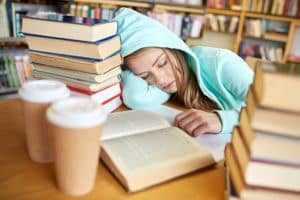 A couple of things we know about high school-age teens: they engage in risky behavior, and they don’t get enough sleep. And now a CDC study suggests that these two facts are related.
A couple of things we know about high school-age teens: they engage in risky behavior, and they don’t get enough sleep. And now a CDC study suggests that these two facts are related.
The Center for Disease Control found that almost 70 percent of teens reported that they don’t get enough sleep on an average school night. Most parents would probably agree.
What’s startling is that sleep deprivation is associated with behavior that is a health risk. This includes drinking, smoking, physical inactivity, and impaired driving.
The CDC surveyed over 50,000 high schoolers on their sleep habits. Among the findings: those who got insufficient sleep were also more likely to admit to:
- Not using a bicycle helmet
- Not wearing a seat belt
- Riding with a drinking driver
- Drinking while driving
- Texting while driving
This is big news because, as another CDC report states, “unintentional injuries are the leading cause of death for adolescents, with approximately two thirds of these fatalities related to road traffic crashes.” If a lack of sleep is one of the factors causing these deaths, than we have been ignoring a lethal social trend.
The good news here is that it’s not as hard to reverse this trend, provided we’re all determined to do so. In some municipalities, schools have begun starting high school later, to let students sleep more.
If you’re a parent and you’re worried that your teen isn’t sleeping enough, you now have more incentive than ever to turn things around. Here are some things you can do:
- Don’t keep caffeinated soft drinks at home. Teens are unlikely to make coffee in the evening, but they might grab a drink that has just as much caffeine.
- Screens off. Enforce a rule of no screens, including cellphones, after a certain time at night – say nine p.m. or so
- Make sleep a priority. We always manage to make sure our kids get food and shelter – now we need to make sure they get sleep as well. When a new activity is proposed, it’s necessary to ask, “Will this interefere with sleep?”
Life is risky enough without adding risky behavior. And few activities are as dangerous as drunk driving. Helping your teen get more sleep might be the simplest way to make the roads – and your own child – safer.
